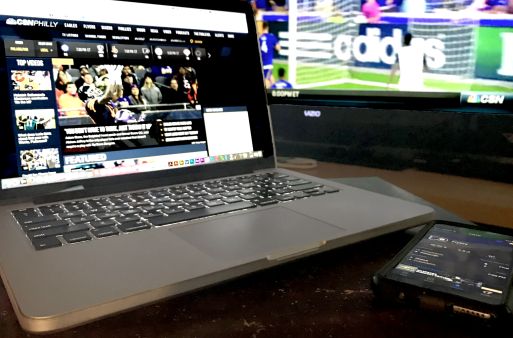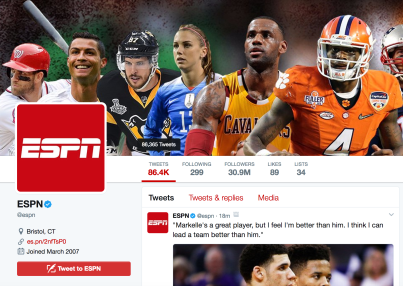The score, the highlights, the schedule and even the live game are now all available on a smartphone and social media.
Social media use has been steadily increasing from 2010 until today. In 2016 there were 2.34 billion social media users worldwide and that number is expected to increase to 2.67 billion is 2018. In the United States alone there were 207.1 million smartphone users, which is predicted to increase to 236.3 million in 2018.
The increased popularity of social media and the smartphone is changing the way sports fans view and stay updated on their favorite teams. Many believe that the addition of social media and the mobile phone is positive in the sports world but not everyone agrees.
Social media, apps and live streaming
Sports news is the second most deliberately sought out topic, followed by business news, according to Pew Research Center. Social media and apps make it even easier for individuals to find what they are looking for because it is all at their fingertips.
Twitter is a popular vehicle for sports teams and associations to share information. Sports fans are 67 percent more likely to turn to Twitter as a “second screen” than non-sports fans. They use the platform before, during and after a game. Twitter, like other social media platforms, allows all statistics, scores and highlights to be instant and easily available.

Social media is a great vehicle because it allows for two-way communication. Fans can see the opinions of others and they are able to interact by sharing, liking and commenting, as well as using popular hashtags like #MarchMadness and #BecauseItsTheCup.
The smartphone makes accessing this information even easier. Not only are the social media apps available but there are apps specifically for sports fans. Apps range from general sports news to sport- and team-specific apps. A hockey fan can download the NHL app and the Philadelphia Flyers app for the schedule, scores, news, roster, tickets and more. During March Madness, for instance, there was an app called NCAA March Madness Live which allowed individuals to follow their brackets, choose their favorite teams, learn about the teams, view highlights and even watch live games right on their device.
Live streaming is also a popular tread that is taking the sports world by storm. Apps like WatchESPN allow viewers to live stream the games straight to their phone so they do not miss a second. Even Twitter and Facebook are getting in on the action and allowing fans to watch their favorite sports in real-time.
Loquitur Media recently sent out a survey asking sports fans if they use their smartphone to follow sports. Six of the 11 participants in the Loquitur Media survey said they follow sports at least a little bit. All six of those individuals said they use their smartphone at least sometimes to keep up with the games.
“It’s easier to see what’s going on even when I can’t watch it. I get scores and updates sent to my phone during a game so I know what is happening when I’m not close to a TV or I can actually watch the game from my phone,” one participant wrote.
Popular apps listed by participants included ESPN, team apps, Yahoo Fantasy and social media apps like Facebook and Twitter.
With the mobile phone and social media all the information sports fans need is available all day, everyday.
Is it possible to have too much information?
Though there are numerous reasons the smartphone is helping fans, it is not all great for those who enjoy sports but do not want to be constantly fed information.
Having information continuously being shared on social media and sports apps can eliminate the element of surprise. In 2016, the NCAA bracket was leaked on Twitter an hour before it was suppose to be revealed. So when the bracket was officially released there was less excitement around it.
Though many participants in the Loquitur Media survey answered that they used their smartphone at least sometimes to keep up with sports some did have different opinions.
“It’s so much harder to have sports debates, like who’s hit the most home-runs in a season, since everything’s online,” one participant wrote.

Due to the number of apps out there and social media accounts information is constantly being shared but it may be too much for some. On March 27, ESPN posted and retweeted 24 times on Twitter and both NCAA and NCAA March Madness tweeted and retweeted a combined 26 times. Following these, plus other sports accounts, will fill a newsfeed and that could be considered overbearing to some.
Receiving up-to-the-second scores and highlights can be a challenge for those who miss the game and want to watch later. Recording a game on television means keeping away from the smartphone and social media as much as possible to avoid spoilers. The score and key events from the game are posted everywhere which makes it nearly impossible to be surprised when watching the game on your own time. If notifications are turned on, social media and sports apps will send updates straight to the lock screen.
The phone can even be a distraction while attending a sporting event.
“I think [smartphones] made the experience worse. Fans are going to actual sporting events and looking at their phones more so than the game!” one survey participant wrote.



